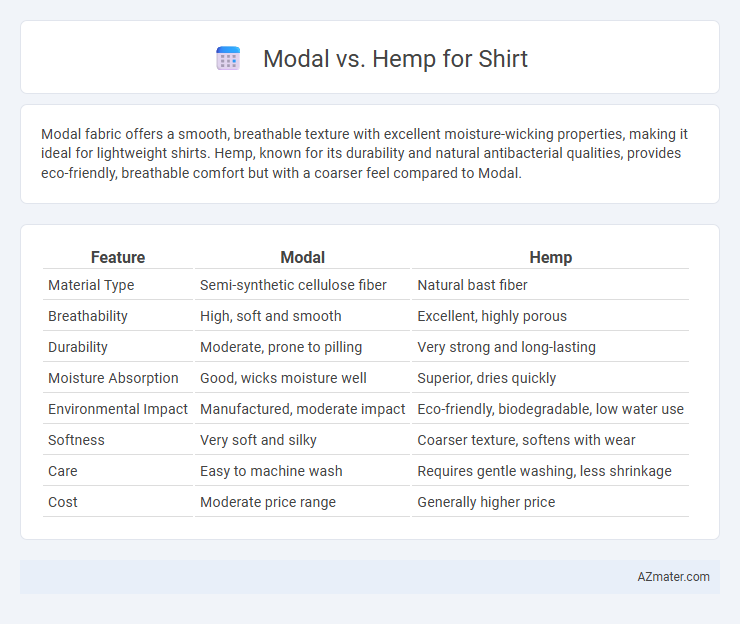Modal fabric offers a smooth, breathable texture with excellent moisture-wicking properties, making it ideal for lightweight shirts. Hemp, known for its durability and natural antibacterial qualities, provides eco-friendly, breathable comfort but with a coarser feel compared to Modal.
Table of Comparison
| Feature | Modal | Hemp |
|---|---|---|
| Material Type | Semi-synthetic cellulose fiber | Natural bast fiber |
| Breathability | High, soft and smooth | Excellent, highly porous |
| Durability | Moderate, prone to pilling | Very strong and long-lasting |
| Moisture Absorption | Good, wicks moisture well | Superior, dries quickly |
| Environmental Impact | Manufactured, moderate impact | Eco-friendly, biodegradable, low water use |
| Softness | Very soft and silky | Coarser texture, softens with wear |
| Care | Easy to machine wash | Requires gentle washing, less shrinkage |
| Cost | Moderate price range | Generally higher price |
Introduction to Modal and Hemp Fabrics
Modal fabric, derived from beech tree pulp, is renowned for its softness, breathability, and excellent moisture-wicking properties, making it ideal for comfortable shirts. Hemp fabric, made from the durable fibers of the hemp plant, offers remarkable strength, natural antibacterial qualities, and eco-friendly sustainability, appealing to environmentally conscious consumers. Both materials blend comfort and functionality but differ significantly in texture, durability, and environmental impact.
What is Modal? Key Features and Benefits
Modal is a semi-synthetic fabric made from beech tree pulp, known for its exceptional softness and breathability. It offers high moisture-wicking properties, resistance to shrinkage, and enhanced durability compared to traditional cotton. Modal's smooth texture and vibrant color retention make it a popular choice for comfortable, lightweight shirts.
What is Hemp? Key Features and Benefits
Hemp is a natural fiber derived from the Cannabis sativa plant, known for its exceptional durability, breathability, and antimicrobial properties. Shirts made from hemp offer sustainability benefits due to the plant's low water usage and resistance to pests, reducing the need for harmful pesticides. The fiber's strength ensures long-lasting wear, while its moisture-wicking ability keeps the wearer cool and comfortable.
Comfort Comparison: Modal vs Hemp Shirts
Modal shirts offer exceptional softness and breathability due to their semi-synthetic fibers derived from beech tree pulp, providing a smooth and lightweight feel ideal for sensitive skin. Hemp shirts, made from natural hemp fibers, deliver superior durability and moisture-wicking properties but often feel coarser and thicker compared to modal. For optimal comfort, modal excels in softness and smoothness, while hemp provides a more robust texture with eco-friendly benefits.
Durability and Longevity: Which Lasts Longer?
Hemp shirts generally offer superior durability and longevity compared to modal, as hemp fibers are naturally resistant to wear, tearing, and UV degradation, making them ideal for long-term use. Modal, derived from beech tree cellulose, provides exceptional softness and breathability but tends to weaken with frequent washing and prolonged use. Investing in hemp fabric ensures a robust garment that maintains its shape and integrity over time, while modal prioritizes comfort at the expense of extended durability.
Environmental Impact: Modal vs Hemp Sustainability
Hemp has a lower environmental impact compared to modal, as it requires less water, fewer pesticides, and enriches soil health through nitrogen fixation. Modal, derived from beech trees, involves energy-intensive processing and chemical treatments that contribute to pollution despite its biodegradability. Hemp's rapid growth cycles and minimal resource needs make it a more sustainable choice for eco-friendly shirt production.
Breathability and Moisture-Wicking Properties
Hemp fibers offer exceptional breathability due to their porous structure, allowing air to circulate freely and keeping the wearer cool. Modal, derived from beech trees, excels in moisture-wicking, quickly drawing sweat away from the skin to enhance comfort during physical activity. Combining hemp's natural ventilation with modal's moisture management creates shirts that are ideal for temperature regulation and prolonged wear in warm conditions.
Style Versatility and Color Retention
Modal fabric offers exceptional style versatility due to its smooth texture and ability to drape elegantly, making it ideal for both casual and formal shirts. Hemp, known for its durability and natural fibrous texture, provides a more rustic, casual aesthetic but excels in color retention thanks to its resistance to fading. While modal maintains vibrant hues through multiple washes, hemp delivers long-lasting color stability, making each fabric uniquely suited to different fashion needs.
Price Comparison: Modal vs Hemp Shirts
Modal shirts typically cost more than hemp shirts due to the intensive manufacturing process and the use of beechwood fibers. Hemp shirts are generally more affordable, benefiting from the crop's rapid growth and lower environmental impact on production costs. Price comparison shows modal shirts averaging $30-$50, while hemp shirts often fall within the $20-$40 range, making hemp a cost-effective choice.
Which is Better for Shirts: Modal or Hemp?
Modal fabric offers superior softness, breathability, and moisture-wicking properties, making it ideal for comfortable shirts with a smooth texture. Hemp is highly durable, eco-friendly, and naturally antimicrobial, providing long-lasting shirts with excellent resistance to wear and odor. For ultimate comfort and softness, modal is better, while hemp excels in sustainability and durability for shirts.

Infographic: Modal vs Hemp for Shirt
 azmater.com
azmater.com